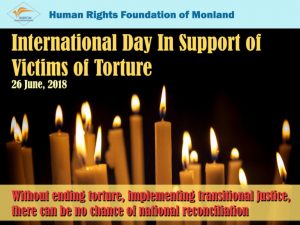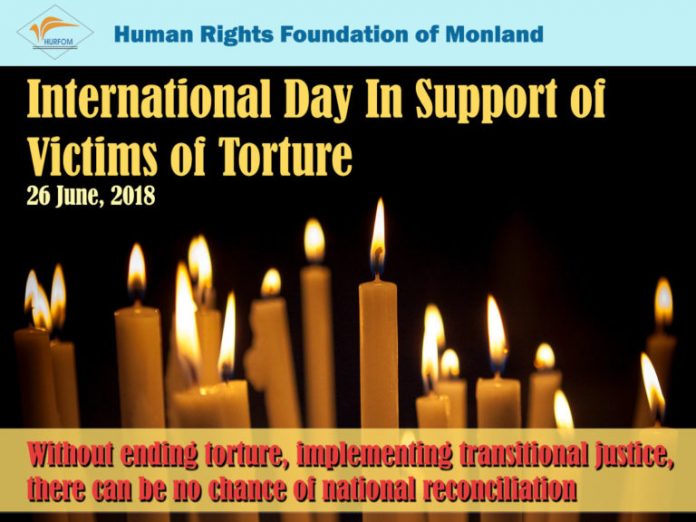Today on International Day in Support of Victims of Torture, HURFOM wishes to express solidarity with survivors of torture around the world, as well as draw attention to the serious violations ongoing in Burma.
The military, police, and Ethnic Armed Organizations (EAOs) in Burma have for decades used torture against civilians, in direct violation of international customary law.
The United Nations Convention against Torture, which came into force on this day 31 years ago, has still not been signed by the Burmese government.
HURFOM calls on the government and the military to respect international law, immediately end the use of torture, and to provide justice for victims of torture. The effects of torture go beyond merely the act itself, or the individual. The mental as well as physical trauma can last a lifetime, and the consequences for families and communities can multiply. The government and the international community should therefore also support victim rehabilitation programs, such as AAPP’s Mental Health Assistance Program.
 The time has come to demand justice for victims of human rights violations. The government and people’s desire for national reconciliation cannot progress without acknowledging the wrongs of the past, ensuring justice and redress for victims, and guaranteeing that human rights violations never happen again.
The time has come to demand justice for victims of human rights violations. The government and people’s desire for national reconciliation cannot progress without acknowledging the wrongs of the past, ensuring justice and redress for victims, and guaranteeing that human rights violations never happen again.
Victims of torture have the right to compensation and rehabilitation. They also deserve and have the right to know the truth. That is why it is so critical to investigate instances of torture, identify the perpetrators, and bring them to justice.
On this International Day in Support of Victims of Torture, HURFOM wants to draw attention to both ongoing and past cases of torture in Mon areas of Burma, and to point to ways forward to end these gross violations.
One of the most important ways by which the ongoing torture of civilians by police and military can be ended is through institutional reform.
The current judicial system perpetuates impunity for perpetrators, by institutionalising a division between civilian, military, and police law. This means that military and police are not subject to civilian courts, and are not held accountable for torture and other violations. Impunity for perpetrators, which is encoded in the 2008 constitution, as well as being guaranteed in practice through the judicial system, impedes justice for victims of torture.
Following a case of police torture from May 2018, the policeman charged with the crime will be tried under police law. Police Sergeant Thein Hline Oo allegedly tortured two villagers from Paung Township, Mon State. He was charged under three sections of the Penal Code. In June 2018 the same policeman went back to the village and beat up a witness to the first incident. The Police Chief reported that the police sergeant will be charged under police law.
Likewise in cases of military torture, the military are charged according to military law. In August 2017, members of Burma Navy Unit #43 arrested and tortured six marine workers, resulting in the death of one worker. The naval soldiers arrested and tortured the marine workers despite the workers having the required licenses and recommendation documents for fishing. The five injured workers filed a lawsuit at the Ye City Police Station. Navy officials told them that the legal proceedings would take place in accordance with military or civilian laws.
Impunity for perpetrators, and lack of access to justice, also extends to past instances of torture.
In December 2017 HURFOM published a report ‘“I Still Remember”: Desires for acknowledgement and justice for past human rights violations in Mon areas of southern Burma’.
This report pointed to opportunities for building trust and achieving meaningful national reconciliation for all victims of past violations.
Between 1995 and 2017, HURFOM documented a minimum of 108 incidents of arbitrary arrest, detention, or torture by Burma Army soldiers and EAOs, affecting well over 3,300 individuals. Over 30 Burma Army battalions were implicated in these abuses, the majority of which occurred in Ye Township in Mon State and Yebyu Township in Tenasserim Division.
From 1995 until 2017, HURFOM documented over 57 incidents of extrajudicial killings by the Burma Army and EAOs, for a minimum of 190 deaths of villagers. While the majority of victims were male, HURFOM also documented the killing of women as well as children, some as young as ten months old. Over 27 different Burma Army battalions have been implicated in these abuses.
Since 1995, HURFOM documented over 67 separate incidents of sexual violence committed by the Burma Army, affecting over 106 women, children, and men. These incidents ranged from rape, gang rape, sexual slavery, and forced participation in beauty shows. Over 27 Burma Army battalions were implicated.
The entrenched culture of impunity benefitting perpetrators is by far one of the biggest challenges Burma faces in acknowledging and addressing human rights violations.
Reform of the judicial system, and removal of the impunity encoded in the 2008 constitution, are needed in order to abolish impunity for military and police perpetrators.
The Burma Government, military and ethnic EAOs must also acknowledge both ongoing and past violations. Without ending violations, and instituting meaningful mechanisms of transitional justice, ‘national reconciliation’ will be no more than empty rhetoric, and will not achieve truth and justice for all victims.

